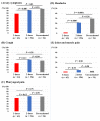Real-World Effectiveness of a Booster Dose of the COVID-19 Vaccines among Japanese University Students
- PMID: 36016171
- PMCID: PMC9413816
- DOI: 10.3390/vaccines10081283
Real-World Effectiveness of a Booster Dose of the COVID-19 Vaccines among Japanese University Students
Abstract
With the spread of the Coronavirus disease 2019 (COVID-19), missing learning opportunities due to COVID-19 has been raised as a major concern for university education. We aimed to examine the effectiveness of a booster dose of COVID-19 vaccines among Japanese university students during the spread of the Omicron variant. We enrolled 249 students who became a close contact and 294 COVID-19-infected students though the Hiroshima University COVID-19 registration system. Infection rates of people in close contact with sick individuals and symptoms of infected students were examined. Close contacts who had received a booster dose showed a significantly lower infection rate (31%) compared with those with two doses (50%, p = 0.02) and the unvaccinated (71%, p = 0.002). Age- and sex-adjusted odds ratios of receipt of a booster dose vs. two doses and unvaccinated were 0.40 (95% confidence interval [CI], 0.23−0.70, p = 0.001) and 0.44 (95% CI, 0.25−0.77, p = 0.004), respectively. The incidence of severe fever (38.5°C or higher) was significantly less prevalent in those with a booster dose (16%) compared with two doses (40%, p = 0.002) and those who were unvaccinated (75%, p < 0.0001). Booster doses reduced infection rates among close-contact students and can help students to avoid missing learning opportunities.
Keywords: COVID-19; Omicron variant; booster dose; close contact; university; vaccine; vaccine hesitancy.
Conflict of interest statement
The authors declare no conflict of interest.
Figures




Similar articles
-
Is a booster dose of COVID-19 vaccines effective on newly dominant omicron subvariants among university students? Comparison between BA.1 and BA.2 dominancy.Am J Infect Control. 2023 Aug;51(8):907-911. doi: 10.1016/j.ajic.2022.11.015. Epub 2022 Nov 24. Am J Infect Control. 2023. PMID: 36435404 Free PMC article.
-
COVID-19 Incidence and Vaccine Effectiveness in University Staff, 1 March 2020-2 April 2022.Vaccines (Basel). 2023 Feb 19;11(2):483. doi: 10.3390/vaccines11020483. Vaccines (Basel). 2023. PMID: 36851360 Free PMC article.
-
Association Between 3 Doses of mRNA COVID-19 Vaccine and Symptomatic Infection Caused by the SARS-CoV-2 Omicron and Delta Variants.JAMA. 2022 Feb 15;327(7):639-651. doi: 10.1001/jama.2022.0470. JAMA. 2022. PMID: 35060999 Free PMC article.
-
Effectiveness of primary series and booster vaccination against SARS-CoV-2 infection and hospitalisation among adolescents aged 12-17 years in Singapore: a national cohort study.Lancet Infect Dis. 2023 Feb;23(2):177-182. doi: 10.1016/S1473-3099(22)00573-4. Epub 2022 Sep 28. Lancet Infect Dis. 2023. PMID: 36182678 Free PMC article.
-
The Vaccine Efficacy Against the SARS-CoV-2 Omicron: A Systemic Review and Meta-Analysis.Front Public Health. 2022 Jul 13;10:940956. doi: 10.3389/fpubh.2022.940956. eCollection 2022. Front Public Health. 2022. PMID: 35910897 Free PMC article.
Cited by
-
SARS-CoV-2 Symptoms during the Omicron Surge Differ between Boosted and Vaccinated Non-Boosted Persons.Vaccines (Basel). 2024 Mar 19;12(3):327. doi: 10.3390/vaccines12030327. Vaccines (Basel). 2024. PMID: 38543961 Free PMC article.
-
Design and analysis heterogeneity in observational studies of COVID-19 booster effectiveness: A review and case study.Sci Adv. 2023 Dec 22;9(51):eadj3747. doi: 10.1126/sciadv.adj3747. Epub 2023 Dec 20. Sci Adv. 2023. PMID: 38117882 Free PMC article. Review.
-
COVID-19 Vaccine Effectiveness of Booster Doses Against Delta and Omicron Variants Over Follow-up Times Using Longitudinal Meta-analysis.J Res Health Sci. 2024 Sep 30;24(4):e00626. doi: 10.34172/jrhs.2024.161. Epub 2024 Sep 30. J Res Health Sci. 2024. PMID: 39431651 Free PMC article.
-
Lessons Learned from the COVID-19 Pandemic and How Blood Operators Can Prepare for the Next Pandemic.Viruses. 2022 Sep 27;14(10):2126. doi: 10.3390/v14102126. Viruses. 2022. PMID: 36298680 Free PMC article. Review.
-
Design and Analysis Heterogeneity in Observational Studies of COVID-19 Booster Effectiveness: A Review and Case Study.medRxiv [Preprint]. 2023 Jun 28:2023.06.22.23291692. doi: 10.1101/2023.06.22.23291692. medRxiv. 2023. Update in: Sci Adv. 2023 Dec 22;9(51):eadj3747. doi: 10.1126/sciadv.adj3747. PMID: 37425863 Free PMC article. Updated. Preprint.
References
-
- World Health Organization Classification of Omicron (B.1.1.529): SARS-CoV-2 Variant of Concern. [(accessed on 23 December 2021)]. Available online: https://www.who.int/news/item/26-11-2021-classification-of-omicron-(b.1.....
-
- Feikin D.R., Higdon M.M., Abu-Raddad L.J., Andrews N., Araos R., Goldberg Y., Groome M.J., Huppert A., O’Brien K.L., Smith P.G., et al. Duration of effectiveness of vaccines against SARS-CoV-2 infection and COVID-19 disease: Results of a systematic review and meta-regression. Lancet. 2022;399:924–944. doi: 10.1016/S0140-6736(22)00152-0. - DOI - PMC - PubMed
-
- Belik M., Jalkanen P., Lundberg R., Reinholm A., Laine L., Väisänen E., Skön M., Tähtinen P.A., Ivaska L., Pakkanen S.H., et al. Comparative analysis of COVID-19 vaccine responses and third booster dose-induced neutralizing antibodies against Delta and Omicron variants. Nat. Commun. 2022;13:2476. doi: 10.1038/s41467-022-30162-5. - DOI - PMC - PubMed
LinkOut - more resources
Full Text Sources

